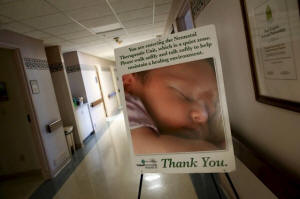|
Obama signs into law opioid addiction
bill to protect newborns
 Send a link to a friend
Send a link to a friend
 [July 23, 2016]
By Duff Wilson [July 23, 2016]
By Duff Wilson
WASHINGTON (Reuters) - President Barack
Obama on Friday signed into law a measure that pledges greater efforts
to protect drug-dependent newborns and assist their parents.
The Comprehensive Addiction and Recovery Act also stresses drug
treatment and overdose prevention to help stanch the nationís heroin and
opioid drug epidemic.
Obama said in a statement that 78 Americans die from opioid overdose
every day, and noted that the legislation included only modest steps to
address the epidemic.
"I am deeply disappointed that Republicans failed to provide any real
resources for those seeking addiction treatment to get the care that
they need," Obama said. "In fact, they blocked efforts by Democrats to
include $920 million in treatment funding."
The bill was passed nearly unanimously by both the House of
Representatives and the Senate.
Efforts to enforce provisions to protect newborns and help their parents
come in response to a Reuters investigation last year titled "Helpless &
Hooked."
The new law requires that the federal government and every state follow
a 2003 law that was routinely ignored. That law called on states to
require hospitals and social services to report, track and assist
drug-dependent newborns and their families.

Reuters found that no more than nine states were following that
requirement. Most children born to addicted mothers, including many
mothers who were taking prescribed methadone, were not being reported by
hospitals as required by law. Often, that was because medical workers
feared involving child protective services, as the existing law
requires. When cases were reported to social services, Reuters found,
efforts to protect the child and help the parents often were limited.
The failures came at a cost. Reuters found more than 110 babies since
2010 died under preventable circumstances after being sent home to
families ill-equipped to care for them. Experts said far more children
have likely died but gone uncounted.
The new law promises a non-punitive approach that includes "safe care
plans" aimed at keeping newborns at home with their parents, who will
receive additional help.
"This is a step forward for vulnerable babies who, due to an opioid
dependency, will begin their lives facing enormous challenges," said
Senator Bob Casey of Pennsylvania, the ranking Democrat on the Senate
subcommittee on children and families. "Reutersí initial reporting
shined a light on a darkness that had enveloped far too many lives.
There is much more work to do but this is a genuine step forward."
Representative John Kline, a Minnesota Republican who chairs the House
Committee on Education and the Workforce, which initiated the measure,
said it will track state actions.
[to top of second column] |

A sign marks the entrance to the Neonatal Therapeutic Unit at Cabell
Huntington Hospital, where staff members have acted to treat an
alarming number of drug-dependent newborns, in Huntington, West
Virginia, October 19, 2015. REUTERS/Jonathan Ernst

"These reforms are an important part of our broader efforts to combat
the nationís opioid epidemic and provide these vulnerable families a
better chance at a brighter future," Kline said in a statement.
In 2013, the latest year with nationwide hospital reporting, 27,315
babies were diagnosed with newborn drug withdrawal syndrome, a five-fold
increase from a decade earlier.
Reuters found that one drug-dependent baby was born on average every 19
minutes in the United States. Some suffer shaking, crying and feeding
problems as they battle withdrawal.
Senator Ron Wyden of Oregon, the ranking Democrat on the Senate Finance
Committee, said the broader addiction law was "no more than a half
measure" without more funding. Wyden has co-sponsored a measure setting
aside money for substance abuse treatment for parents in danger of
losing their children. It passed the House but stalled in the Senate.
Jim Greenwood, a former Pennsylvania congressman who championed the 2003
law, said the deaths Reuters revealed represent "a national disgrace and
glaring failure at the federal, state and local level to implement Plans
of Safe Care for infants." Greenwood, now president of a Washington,
D.C.-based biotechnology group, applauded the new measure "to improve
the health and safety of these babies and their families."
Stephen Patrick, an assistant professor of pediatrics at Vanderbilt
University and leading researcher on the condition, said the new law is
"good news" but added: "Wish there was funding that came with it."
(Reporting by Duff Wilson; Editing by Leslie Adler)
[© 2016 Thomson Reuters. All rights
reserved.]
Copyright 2016 Reuters. All rights reserved. This material may not be published,
broadcast, rewritten or redistributed.

 |